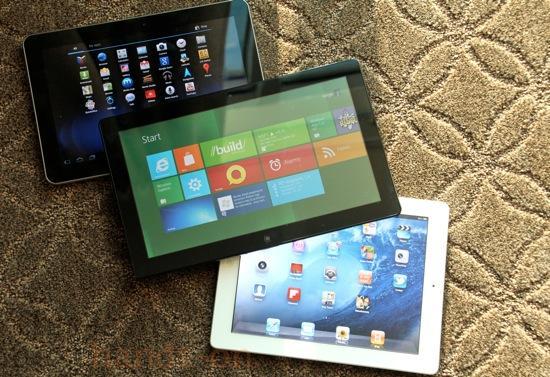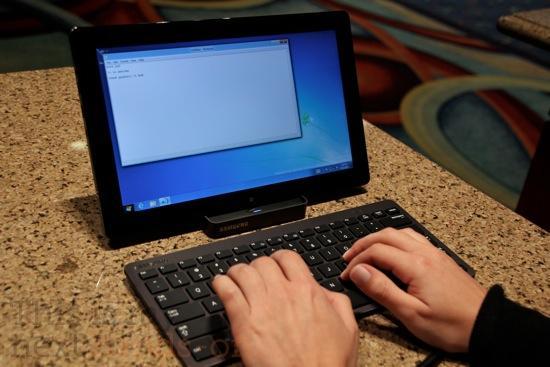
Tablets. You either love them or you hate them. Chances are, if you were on the fence about them, you snagged a TouchPad when they went on sale (if you managed to hunt one down). But the main argument against tablets at this point – and no, I'm not talking about those old Windows tablets – is functionality, or lack thereof. Instead of full-fledged operating systems, modern tablets come equipped with mobile platforms (Android, iOS, webOS, QNX, etc.). For most consumers, this is all they'll ever need. But for many, a mobile OS is hardly everything you need to get the job done.
In the midst of all of this tablet craze, there has been one major player sitting on the sidelines. At first, we wondered if they were even interested in the current tablet market at all. Maybe their previous failures in the tablet industry disheartened them. Maybe they knew something about tablets that we didn't. After all, they were the first to really push the market. Microsoft introduced tablets many moons ago, to a very disinterested audience. People loved the idea of a more portable PC, but they were before their time – the technology simply wasn't there. Battery life was atrocious, performance was sub par and resistive touchscreens (shudder) were not exactly efficient. But Microsoft's perseverance and patience may have finally paid off.
Enter Windows 8.
Microsoft officially announced plans for their next major OS upgrade back at the beginning of June. Earlier today, This is my next was present at BUILD (Microsoft's ongoing developer conference) and got a chance to get their paws on a Windows 8-powered Samsung Developer Preview tablet. They gave an in-depth look at the new operating system. At BUILD, Microsoft made it very clear that Windows 8 is not just a version of their next OS update; it is the update. This is the version of Windows that will run on all PCs, laptops, tablets, etc.
The first two times I read the headline for the Windows 8 video preview, I blew it off. Nothing Microsoft has done in the past seven or eight years has really impressed me at all. In fact, I switched to Linux full-time two years ago and never looked back. I figured Windows 8 would be much of the same. I was wrong ... I think. Windows 8 is a totally different ballgame. It has it all: gestures, better multitasking, app switching, universal search, the familiar PC desktop and a similar Metro UI to what is seen in Windows Phone. The biggest differences between these Windows 8 tablets and every other tablet currently available is that they are working on x86, x64 and ARM architectures. The Samsung tablet This is my next got their hands on is powered by a 1.6GHz Core i5-2467M processor, and it sports a 64GB solid state drive. So boot up time isn't really an issue. The problem with hardware is this thing is fan-cooled, so it will come with some added noise. (Note that this nor battery life will be an issue with an ARM chip.)

That said, this platform borders the line between full and mobile OSes – something Apple is clearly moving towards with OS X and iOS. The Metro UI is the main interface and replaces the all too familiar Start menu within the Windows Desktop, which is simply an app. It can run full Windows programs and mobile-like HTML5 and Javascript apps backed by Internet Explorer 10. If you can overlook the noise from the fan and potentially dreadful battery life (in the Intel-powered tabs, at least), this could bring some serious benefits over existing tablets.
Joanna Stern of This is my next made it very clear that the whole idea behind Windows 8 – mashing up two totally different interfaces – felt very "redundant" and as if the tablet was "schizophrenic" at all times. But as platform mashups become more common and tablets become more PC-like, I feel this is something we will get used to: a "quick access" UI for on the go and the ability to instantly switch to a more work-friendly interface for getting down to business.
Some see it differently and feel that Microsoft should gear Windows Phone towards tablets instead of revamping their full OS to work on the slabs. But Microsoft may have finally got it right, in my book at least. I'll definitely have to get one of these Windows 8 tablets in my hands before I make my final decision, especially one of those ARM-powered ones. But from what I've seen so far, this is exactly what I need in a tablet – paired with a few peripherals, of course.
The only thing we're left wondering is where manufacturers will hit with price point. If they struggle to keep costs down and release these tablets for anything higher than the base model of the iPad, they will have lost the attention of the majority of potential buyers at the starting gates. In other words, if they can't keep these tablets below $500 or $600, they may be wasting their time.
What say you? Did Microsoft finally strike gold? Will Windows 8 be a hit with consumers looking to get more out of the tablet form factor? Or should tablets have dedicated mobile platforms instead?
Images via This is my next